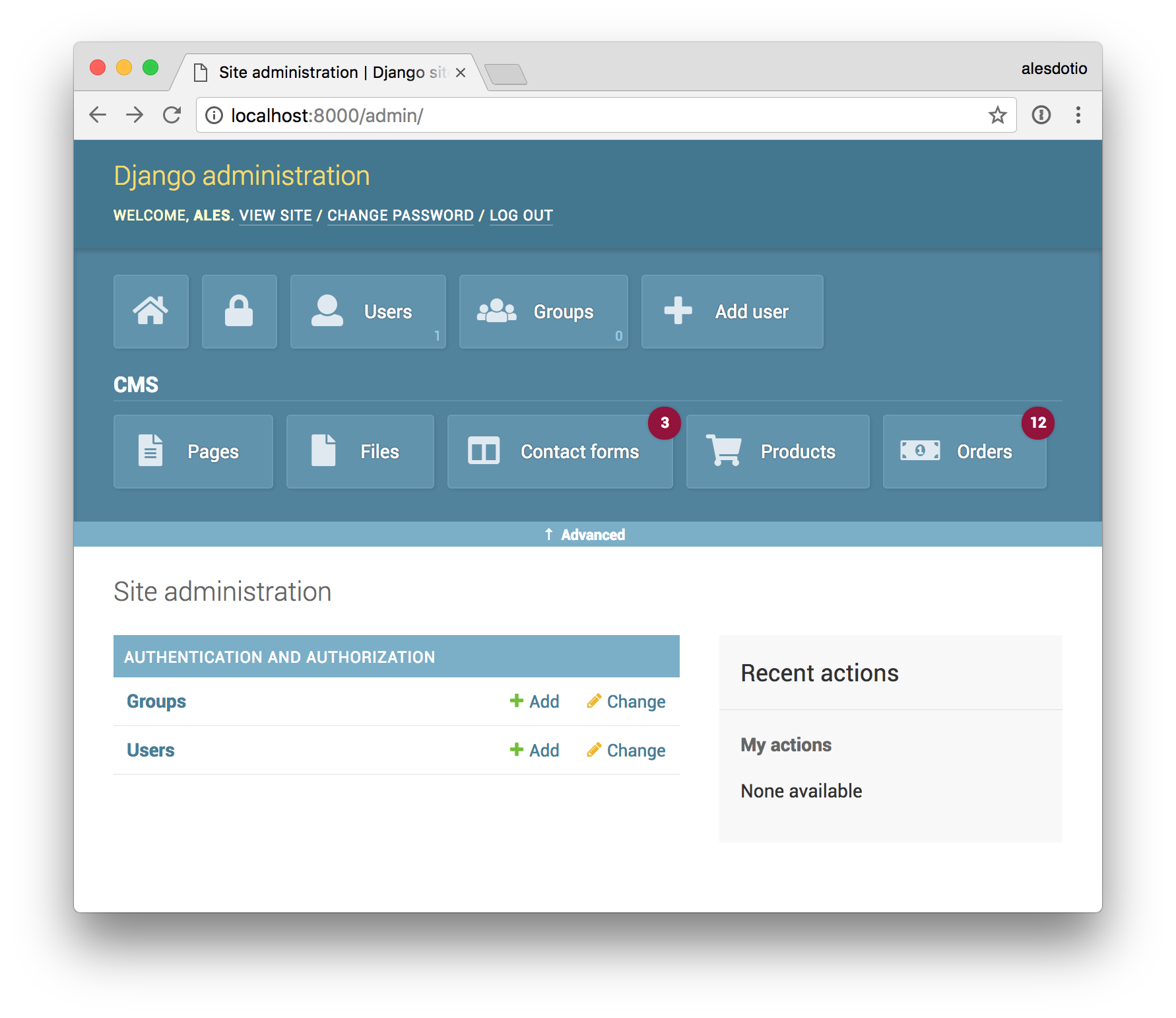Add simple and pretty shortcuts to the django admin homepage.
Project description
Django Admin Shortcuts
What is this?
It's a simple dashboard app that adds shortcuts to your Django admin homepage. The keyword here is SIMPLE!
Why does it exist?
Because some people noted that it's sometimes hard to find the app you are looking for on the admin homepage.
"So why don't we customize the admin site a bit?"
"Nah, I don't want to go through all the hassle of editing templates or setting up a complex dashboard app ..."
Well, good thing django-admin-shortcuts is here, because it only takes five minutes of your time to go from the old dreadfully boring admin to the marvelous engineering excellence that is this app.
How do I use it?
-
pip install django-admin-shortcuts -
add
'admin_shortcuts'to yourINSTALLED_APPS, just before'django.contrib.admin'<-- IMPORTANT -
add
ADMIN_SHORTCUTSto your settingsFor example:
ADMIN_SHORTCUTS = [
{
'title': 'Authentication',
'shortcuts': [
{
'title': 'Groups',
'url_name': 'admin:auth_group_changelist',
'count': 'example.utils.count_groups',
},
{
'title': 'Add user',
'url_name': 'admin:auth_user_add',
'has_perms': 'example.utils.has_perms_to_users',
},
]
},
]
Where ...
- required
url_nameis a name that will be resolved using Django's reverse url method (see Django docs https://docs.djangoproject.com/en/2.0/ref/contrib/admin/#admin-reverse-urls) - optional
app_nameis the name of the admin app that will be used for URL reversal. You can safely ignore this if you have only one admin site in yoururls.py - optional
urlis a direct link that will overrideurl_name - optional
url_extrais extra stuff to be attached at the end of the url (like GET data for pre-filtering admin views) - optional
titleis the title of the shortcut - optional
countandcount_neware paths to a function inside your project that returns something interesting (like a count of all products or a count of all pending orders). The function can optionally take one argument,request, which is the current DjangoHttpRequestobject. - optional
has_permsis a path to a function inside your project that returns information about shortcut visibility on the django admin homepage. Like above, this function can optionally take one argumentrequestas well. - optional
open_new_windowsets whether the link should open in a new window (default is False) - optional
iconis a Font Awesome Solid https://fontawesome.com/icons?d=gallery&s=solid icon class (if you don't specify one, magical ponies will do it for you)
-
profit!!
-
optionally, also add
ADMIN_SHORTCUTS_SETTINGSto your settings
ADMIN_SHORTCUTS_SETTINGS = {
'show_on_all_pages': False,
'hide_app_list': False,
'open_new_window': False,
}
Where ...
- optional
show_on_all_pagesshows the shortcuts on all admin pages - optional
hide_app_listcollapses the app list - optional
open_new_windowmakes all shortcuts open in a new window
What are the settings used in the pretty image above?
ADMIN_SHORTCUTS = [
{
'shortcuts': [
{
'url': '/',
'open_new_window': True,
},
{
'url_name': 'admin:logout',
},
{
'title': 'Users',
'url_name': 'admin:auth_user_changelist',
'count': 'example.utils.count_users',
},
{
'title': 'Groups',
'url_name': 'admin:auth_group_changelist',
'count': 'example.utils.count_groups',
},
{
'title': 'Add user',
'url_name': 'admin:auth_user_add',
'has_perms': 'example.utils.has_perms_to_users',
},
]
},
{
'title': 'CMS',
'shortcuts': [
{
'title': 'Pages',
'url_name': 'admin:index',
},
{
'title': 'Files',
'url_name': 'admin:index',
},
{
'title': 'Contact forms',
'icon': 'columns',
'url_name': 'admin:index',
'count_new': '3',
},
{
'title': 'Products',
'url_name': 'admin:index',
},
{
'title': 'Orders',
'url_name': 'admin:index',
'count_new': '12',
},
]
},
]
ADMIN_SHORTCUTS_SETTINGS = {
'show_on_all_pages': True,
'hide_app_list': True,
'open_new_window': False,
}
I want to change how stuff looks
- to change the CSS overwrite the
templates/admin_shortcuts/base.csstemplate - to change the which icons are magically selected specify the mappings in
ADMIN_SHORTCUTS_CLASS_MAPPINGS
Project details
Release history Release notifications | RSS feed
Download files
Download the file for your platform. If you're not sure which to choose, learn more about installing packages.
Source Distribution
File details
Details for the file django-admin-shortcuts-2.1.0.tar.gz.
File metadata
- Download URL: django-admin-shortcuts-2.1.0.tar.gz
- Upload date:
- Size: 10.3 kB
- Tags: Source
- Uploaded using Trusted Publishing? No
- Uploaded via: twine/4.0.2 CPython/3.11.4
File hashes
| Algorithm | Hash digest | |
|---|---|---|
| SHA256 | 0d598e612a0460c90e1167c0f7007c12725706f48a0f27983d96c01a2fe39c95 |
|
| MD5 | 50e73f11ab513a29227240686f104126 |
|
| BLAKE2b-256 | 6185630cb5ea42ddcfeb11a629a245afa6485dcae92c5c381d7865745d11c2ca |












